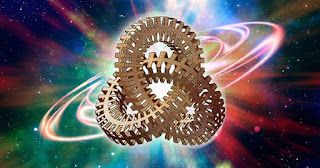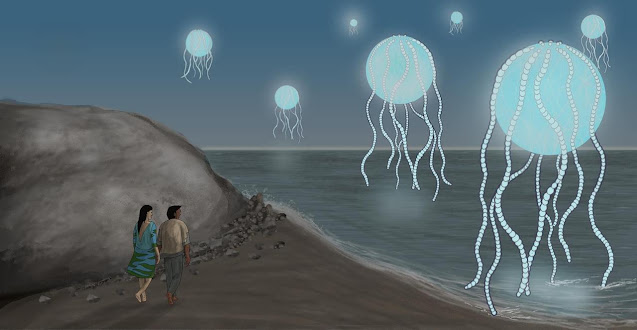In the Beginning.... Right Answers, Wrong Questions
People have so many questions about it. Some of those questions have answers, some do not.
Some of the answers just create more questions.
Some of the answers are simply wrong, but the most difficult thing for some people to get their head around is the idea that some of the questions are wrong.
A very common question is: What was there before the Big Bang? Or in other words: What caused the Big Bang?
Now, I'm telling you this question is WRONG. You're thinking: Huh? How can a question be wrong?
OK, let me give you another example of a wrong question:
What is the angle of a square's fifth corner?
The question makes no logical sense because a square only has four corners. There is no fifth corner to measure.
Asking what was before the Big Bang equally makes no logical sense, and to understand why this is the case you need to know a few things that are simple to explain but difficult to accept...
First of all, what WAS the Big Bang? Well, it was not big... Imagine all of the energy in the universe (which includes all the matter, because matter is made of energy) all concentrated into one very small region, say about the size of a blueberry.
How do we know this? Because on a grand scale galaxies are moving away from each other. Extrapolating from this, they must have been close together in the past. By calculating the current rate of expansion we come to a figure of 13.8 billion years since the beginning of this movement.
Also, it was not a bang. It was not an explosion, it was an expansion. An expansion of what? All that squished-up energy, yes? Correct, but not JUST energy.... it was also an expansion of space itself.
And just like you cannot have matter without energy, you cannot have space without time. They are one phenomenon: spacetime.
So the Big Bang was an expansion of energy, space and time. Lots of people think of it as an explosion in empty space, but actually it was an expansion... OF space. And time.
It was not an expansion IN the universe, it was the expansion OF the universe.
The Big Bang WAS the universe and it is still expanding...
But you're still confused. OK, the universe used to be a tiny ball of energy and it expanded, but "Where did it come from?" and "What is it expanding into?"
More wrong questions. I've explained that the Big Bang was the universe itself, but you still do not understand because you do not know what the universe is...
Simply put, the universe is everything. Not just all of space but also all of time because, remember, they are one.
Therefore, when you ask "What was before the Big Bang?" you are actually asking me "What was before time? .... which is a meaningless question.
A simple answer to a wrong question is misleading. For example, I could give the answer" Nothing." and your next question will be: How can something come from nothing?
It can't. But that was not what I meant by nothing. I did not mean: Before the universe existed, there was nothing. What I meant was: there is no such thing as "before".
The Big Bang was the beginning of the universe. It was the beginning of space and time. You cannot have a "before the beginning". It makes no logical sense. It is like asking me to measure the fifth corner of a square. Or asking what is north of the North Pole.
Or me saying to you: "I am not wearing a hat. What colour is it?"
BUT! You insist... Where did it COME From?
Wrong question. The Big Bang is the universe. The universe is everything. Every THING includes every WHERE. There is nowhere else for it to come from.
Now you're getting a bit irritated. Your brain is going round and round trying to find a comforting, familiar point of reference. It makes no sense, you say. But how can it? There simply is no way for it to make sense in the way you want it to.
Think about it... Suppose I did have an answer to what was before the Big Bang. Suppose I said this universe came from a previous universe, or a multiverse, or eternity.... That does not actually answer the question, it only pushes it back because it raises the next question: Where did (whatever came before the Big Bang) come from? And so on and so on forever, something philosophers call Infinite Regress.
Now you're getting angry. What about the First Law of Thermodynamics? you cry. Energy cannot be created or destroyed, it can only change form. Surely there is a clue in there?
Well, there kind of is, but you might not like it... If energy cannot be created, does that mean that the Big Bang must NOT have been the beginning, because that would imply that energy was created at that moment? No, it does not. If anything, it implies that the energy of the Big Bang is eternal.
So is that the answer? Eternity? Well, no, and to explain why eternity is not the answer is the same explanation for your next question....
Steam is coming out of your ears and nostrils now. But but but... Cause and effect! you shriek. Every effect has a cause. Correct, I say, but how can you be certain that the Big Bang was an effect? If you insist that every event must be caused by a preceding event, we are back to the problem of infinite regress. It does not truly answer your question.
The same part of your brain that insists that there MUST be a First Cause is also insisting that there MUST be something before THAT.... and you're back in the infinite regress... Or is it an infinite loop?
It makes no sense! you holler. Well, yes, you are right, it makes no intuitive sense, but that is because you are trying to fit the whole universe into a tidy, convenient, intuitive little box. You insist that everything in the world has essential characteristics like an origin or a cause... but the universe is not IN the world. It is bigger than your everyday experiences.
Your eyes glaze over. Maybe we could get more clues if we look outside the universe? you whimper. Sorry, no can do. Just as there is no such thing as "before time" there is also no such thing as "outside of space".
But the universe is expanding, it must be expanding INTO something! you sob. No, sonny, that's not how it works. Yes, the universe is expanding, but that just means that the space between distant galaxies is increasing. There is no "edge".
How can we be sure the universe has no edge? For the same reason we can be sure that the Big Bang was an expansion of the whole universe: the cosmic microwave background (CMB). This is a form of radiation that is visible (to our detectors) from all directions. It fills up the whole sky and is nearly uniform no matter which direction we turn our detectors. This radiation is the 'afterglow' of the Big Bang.
Many people think of the universe as being a spherical object ballooning outwards from the a central point (the Big Bang) with galaxies swirling around inside it... But this is not the case. If it WAS the case, we would only see the CMB in one direction (towards the centre), taking up no more than half of the sky.
Also, if we look at those distant, receding galaxies, they look quite different to those closer to us. Spectroscopic analysis shows that they contain fewer elements heavier than lithium, which is consistent with them forming early in the lifetime of the universe, before stars had time to create heavier elements.
So if all these old, distant galaxies are moving away from us - in EVERY direction - does that mean that we are at the centre of the expanding universe? No, it means that the universe is homogenous (it looks the same from any location) and isotropic (it looks the same in every direction). This is called the Cosmological Principle.
How can that be possible!? you gasp. Yes, we'll, I know it is strange but that is only if you think of the universe being a sphere. It is NOT a three-dimensional object. Think of it as the surface of an expanding balloon, with galaxies as dots drawn on the surface. As the balloon expands all of the dots are moving away from each other. None of them are near a centre or an edge because the surface has no centre or edge.
Imagine you are on the Moon and you pick a direction and start walking. Eventually you will walk all the way round and come back to your starting point. The surface has no end and no beginning.
No, no, no, you groan, it cannot be this way... What about multiverse theory? What about a supernatural creator?
Well, those are certainly possibilities.... but with zero evidence they can never be anything but speculation.
Neil deGrasse Tyson said "The universe is under no obligation to make sense to you."
Science does not have an answer to every question. It simply investigates what we can observe. Whatever has no evidence is simply speculation. Is our universe an inside-out black hole, spitting out all the energy/matter it wolfed down in another universe? This was an idea by Stephen Hawking. It's a nice idea but we have no way of knowing if it is true.
All we have to work with is what we can see. Other universes may well exist, but if they do we cannot get any information about them. Each would exist in a totally separate spacetime continuum, not 'outside' but, just like this universe, totally self-contained.
Nevertheless, we DO know what we DO know. The facts of the Big Bang, frustratingly non-intuitive as they may be, are there and they show us what the universe is: strange and mysterious but consistent and real.
Whether this makes your mind expand - or your brain explode - is just another question that science cannot answer! Probably a bit of both....








Comments
Post a Comment